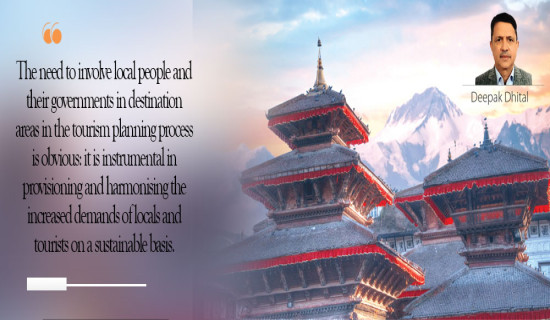- Friday, 26 April 2024
Concerns On Economy
Nepal’s economy is undergoing a tough time owing to the both internal and external factors. Soaring price hike of consumer goods and energy, high interest rate and liquidity crunch have hit both business community and common people alike. A delegation of the Federation of Nepali Chamber of Commerce and Industry (FNCCI) has met and urged the Prime Minister, heads of major political parties and concerned stakeholders to take immediate measures to resolve the problems facing the business and industrial sector. Various business groups have been also coming to the streets to protest the high interest rates that banks are charging from them. The high interest rates unveiled by the banks and financial institutions aim to mobilise the deposits to overcome the liquidity crisis but this has negatively affected the business environment and hurt the prospects of employment generation in the country.
The other day, the FNCCI presented a litany of problems facing the national economy. It has stated that the business companies have failed to have minimum revenue to cover the ordinary expenses as the price hike remained highest in the past seven years. In order to give impetus to the slackened business and economy, the private sector has put forth demands and suggestions before the government. During a meeting with Prime Minister Sher Bahadur Deuba, a FNCCI team has asked to rescind Nepal Rastra Bank’s directives on ‘working capital loan’ and bring down the bank interest rates by maintaining liquidity in the market, according to a news report of this daily published on Wednesday. The apex body of business community has insisted that the first quarter review of the monetary policy of the current Fiscal Year 2022/23 could not address the existing problems.
The FNCCI has demanded that the government shelve the ‘Working Guidelines 2022’ for two years in view of shrinking investment and revenue, stating that it has only added complexity to businesses. Fluctuations of interest rates, internationally skyrocketed fuel and raw material prices, and logistics and freight charges have added complexity to the economy already hit hard by the COVID-19 pandemic. Business people have lamented that it has become difficult to operate industries owing to a mismatch between the determination of the estimated financial statement and determination of the actual required limit of working capital. They have called for reducing mandatory cash ration by one percentage point and transferring the amount of government treasury to manage liquidity.
The Prime Minister has reiterated the government's commitment to create an environment conducive for operating business and industries, and to provide security to the industrial sector. Speaking at a cabinet meeting on Tuesday, PM Deuba said that he was aware of the economic hardships and would discuss with all parties concerned to find a solution to the problem. PM's remarks came after Home Minister Balkrishna Khand, Finance Minister Janardan Sharma and Minister for Industry, Commerce and Supplies Dilendra Prasad Badu called for reviewing the current monetary policy and the interest rates, which they said, have invited economic woes. Meanwhile, the cabinet meeting has decided to lift an eight-month ban on the import of luxury items that included vehicles, mobile sets, liquor and motorcycles effective from December 16. In April, the government had imposed import restrictions to check the fast depletion of foreign reserves. This step is likely to boost business activities as some of the production sectors of the country are based on import.

.jpg)







-original-thumb.jpg)







